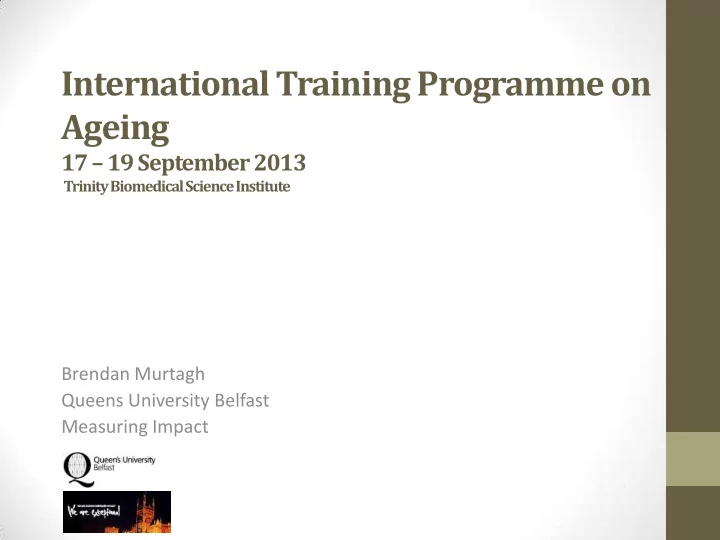

International Training Programme on Ageing 17 – 19 September 2013 Trinity Biomedical Science Institute Brendan Murtagh Queens University Belfast Measuring Impact
• The discourses of research impact • Lack of public confidence; is it really independent? • Waste of public money • Unnecessarily complicated academia • Irrelevant and self-serving • Disconnected from ‘the user’ • Unaccountable and deliberately mysterious
Impact as part of the research value chain • Equally neglected is the relationship between research and policy and practice and how the involvement of these groups in the research process might improve the impact of knowledge translation. FUTUREAGE: [http://futurage.group.shef.ac.uk /user-involvement.html] http://www.idrc.ca/EN/Resources
Defining impact: ESRC • Academic impact is the • The impact of social science demonstrable contribution research can be categorised that excellent social and as: economic research makes to • Instrumental : influencing the scientific advances, across development of policy, practice or service provision, shaping and within disciplines, legislation, altering behaviour including significant advances • Conceptual : contributing to the in understanding, method, understanding of policy issues, theory and application. reframing debates • Economic and societal impact • Capacity building : through is the demonstrable technical and personal skill contribution that excellent development. social and economic research makes to society and the economy, of benefit to individuals, organisations and nations.
Planning research impact • Identify your key stakeholders • Identify how they will benefit from your research • Identify how you will ensure they have the opportunity to benefit
Toolkits and resources across disciplines https://becker.wustl.edu/impact-assessment Washington University in St Louis Medicine
REF Review of Impact Pilot • Committed to a case study approach • Impact should be defined broadly to include social, economic, cultural, environmental, health and quality of life benefits. • Impacts from research typically develop over extended periods of time • The REF should include benefits arising from engaging the public with research • The two criteria for assessing impact – ‘reach’ and ‘significance’ are applicable across all disciplines.
RCUK: implications for best practice • Keep it simple • Make it targeted – do the right things; don't try to do everything • Involve the whole research team – gather ideas and build ownership • Communicate it effectively within the team and externally • Build in review mechanisms to measure effectiveness and plan ahead • Update it regularly in the light of experience and opportunities • Share successes and knowledge about what works and what doesn't
Benefits of impact strategies • Stay focused on the useful outputs from your research – making it more likely that your research will make a difference to people’s lives; • Get the language and approach right; throughout your project – in your recruitment material, research tools and reports; • Get better quality data, a more-rounded and informed interpretation of the data and findings that have greater credibility with your funders and other key stakeholders; • Gain personally from new relationships and a greater knowledge and understanding of the people you work with; • Reach a much wider audience with your reports and presentations – in particular reaching the people who are most likely to make use of your results; • Identify research gaps or follow on studies. Blackman et al (2010, p.37)
Problems with research impact • Whose impact • The politics of research • Impact is determined by the consumer as well as the producer • How is reach and significance measured • What metrics are valid • Inappropriate impact and tokenism • Attribution, causality and time • Ethics and disclosure
Implications • Impact is critical but not new to researchers • Plan impact at the design stage • Good practical tools and resources • Pragmatism in funding but also ethical • Defining the researchers understanding of impact and the value of research
Recommend
More recommend